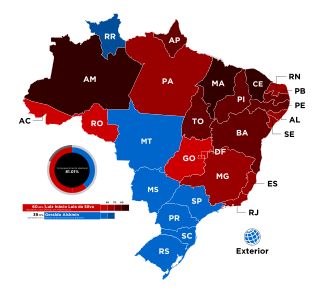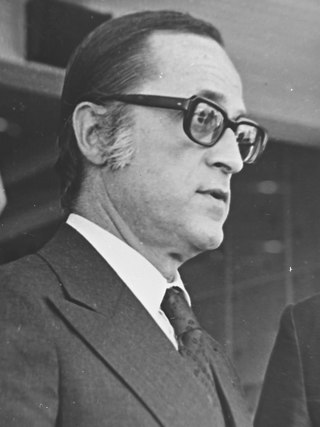
The National Congress is the legislative body of Brazil's federal government. Unlike the state legislative assemblies and municipal chambers, the Congress is bicameral, composed of the Federal Senate and the Chamber of Deputies. The Congress meets annually in Brasília from 2 February to 22 December, with a mid-term break taking place between 17 July and 1 August.

Tancredo de Almeida Neves was a Brazilian politician, lawyer, and entrepreneur. He served as Minister of Justice and Internal Affairs from 1953 to 1954, President of the Council of Ministers from 1961 to 1962, Minister of Finance in 1962, and as Governor of Minas Gerais from 1983 to 1984. He was elected President of the Republic in 1985, but died before taking office.

Progressistas is a centre-right to right-wing political party in Brazil. Founded in 1995 as the Brazilian Progressive Party, it emerged from parties that were successors to ARENA, the ruling party of the Brazilian military dictatorship. A pragmatist party, it supported the governments of presidents Fernando Henrique Cardoso, Luiz Inácio Lula da Silva, Dilma Rousseff, Michel Temer and Jair Bolsonaro. Largely it was the party of the politics of Paulo Maluf, a former governor and mayor of São Paulo. Of all political parties, in corruption investigation Operation Car Wash, the Progressistas had the most convictions.

The Republicans, formerly the Brazilian Republican Party and originally formed as the Municipalist Renewal Party, is a Brazilian political party. Its electoral number, the numerical assignment for Brazilian political parties, is 10.

Lauro Severiano Müller was a Brazilian politician, diplomat, and military engineer. Responsible for the transition of Santa Catarina from a province to a state, he is also recognised as one of those who helped achieve the Brazilian diplomatic victory over Bolivia through the Treaty of Petrópolis, which allowed for the purchase of Acre and its incorporation into Brazil.
The Democrats was a centre-right political party in Brazil that merged with the Social Liberal Party to found the Brazil Union in 2021. It was founded in 1985 under the name of Liberal Front Party from a dissidence of the defunct Democratic Social Party (PDS), successor to the National Renewal Alliance (ARENA), the official party during the military dictatorship of 1964–1985. It changed to its current name in 2007. The original name reflected the party's support of free market policies, rather than the identification with international liberal parties. Instead, the party affiliated itself to the international federations of Christian-democratic (CDI) and conservative parties (IDU). The Democrats' identification number is 25 and its colors are green, blue, and white.

José Wellington Barroso de Araújo Dias, known as Wellington Dias, is a Brazilian politician, Governor of Piauí, and a former federal Senator representing Piauí. He is a member of the Workers' Party.

Marcelo Bezerra Crivella is a Brazilian Evangelical pastor, gospel singer and politician. He served as the mayor of the city of Rio de Janeiro from 1 January 2017 until 31 December 2020. In the 2020 election, Crivella ran for a second term but lost to Eduardo Paes in each of the city's 49 constituencies.

The Federalist Revolution was a civil war that took place in southern Brazil between 1893 and 1895, fought by the federalists, opponents of Rio Grande do Sul state president, Júlio de Castilhos, seeking greater autonomy for the state, decentralization of power by the newly installed First Brazilian Republic.

General elections were held in Brazil on 1 October 2006 to elect the president, National Congress and state governors, with a second round of the presidential election on 29 October as no candidate received more than 50% of the vote in the first round.

Ulysses Silveira Guimarães was a Brazilian politician and lawyer who played an important role in opposing the military dictatorship in Brazil and in the fight to restore democracy in the country. He died in a helicopter accident by the shore near Angra dos Reis, in the south of Rio de Janeiro state.

Events in the year 1969 in Brazil.

Events in the year 1982 in Brazil.

Celso Peçanha was a Brazilian politician, lawyer, and journalist. He served as the acting Governor of Rio de Janeiro state from 1961 to 1962, following the death of his predecessor, Governor Roberto Silveira.

Emir Simão Sader is a Brazilian sociologist and political scientist of Lebanese origin.

Antônio Carlos Konder Reis was a Brazilian politician.
Livres is a Brazilian economic liberal political movement. The political scientist Magno Karl is Livres' current executive director. Livres has 25 members holding public office positions, among them one senator, seven federal deputies, and eight state deputies and nine city councillors, along with economists, political scientists, and more than three thousand registered activists.
Henrique Córdova was a Brazilian politician. He served as Governor of Santa Catarina from 1982 to 1983. He also served as a member of the Chamber of Deputies 1986 to 1991 and 1975 to 1979, as well as the Legislative Assembly of Santa Catarina from 1967 to 1975.

The 2022 Santa Catarina state election took place in the state of Santa Catarina, Brazil on 2 October 2022 and 30 October 2022. Voters elected a Governor, Vice Governor, one Senator, 16 representatives for the Chamber of Deputies and 40 Legislative Assembly members. The incumbent Governor, Carlos Moisés, of the Republicans, was eligible for a second term and ran for reelection.
















